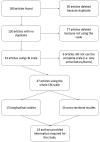A meta-analytic review of the relationship of cancer coping self-efficacy with distress and quality of life
- PMID: 28404938
- PMCID: PMC5482699
- DOI: 10.18632/oncotarget.15758
A meta-analytic review of the relationship of cancer coping self-efficacy with distress and quality of life
Abstract
Self-efficacy for coping with cancer is a specific construct that refers to behaviors that occur in the course of dealing with a cancer diagnosis, cancer treatments, and transitioning to survivorship. One of the more widely used measures of self-efficacy for coping strategies with cancer is the Cancer Behavior Inventory. The following general questions provide a framework for this research: 1. Is self-efficacy for coping with cancer related to distress and quality of life of a cancer patient?. 2. Do self-efficacy for coping with cancer and the target psychological outcomes (i.e., distress and quality of life) change in longitudinal studies, with or without intervention? One-hundred eighty studies cited the different versions of the Cancer Behavior Inventory and 47 used the scale. Result showed an inverse relationship between self-efficacy for coping with cancer and distress, and a positive relationship between self-efficacy for coping with cancer and Quality of Life, both with a large effect size. The strong relationship of self-efficacy and outcomes, resulted of the specificity of the instrument, which targets specific coping strategies that are closely aligned with positive outcomes in adjusting to cancer. However, the results are consistent with the theory, which states that compared to those with low efficacy, highly efficacious people demonstrate less anxiety and better adjustment in stressful situations and consistent with prior results in which self-efficacy is positively related to quality of life.
Keywords: cancer; coping; meta-analysis; quality of life; self-efficacy.
Conflict of interest statement
No conflict of interests for all the authors of the study.
Figures
References
-
- Bandura A. Social Cognitive Theory: An Agentic Perspective. Asian J Soc Psychol. Blackwell Publishers Ltd. 1999;2:21–41. doi: 10.1111/1467-839X.00024. - DOI
Publication types
MeSH terms
LinkOut - more resources
Full Text Sources
Other Literature Sources
Medical




